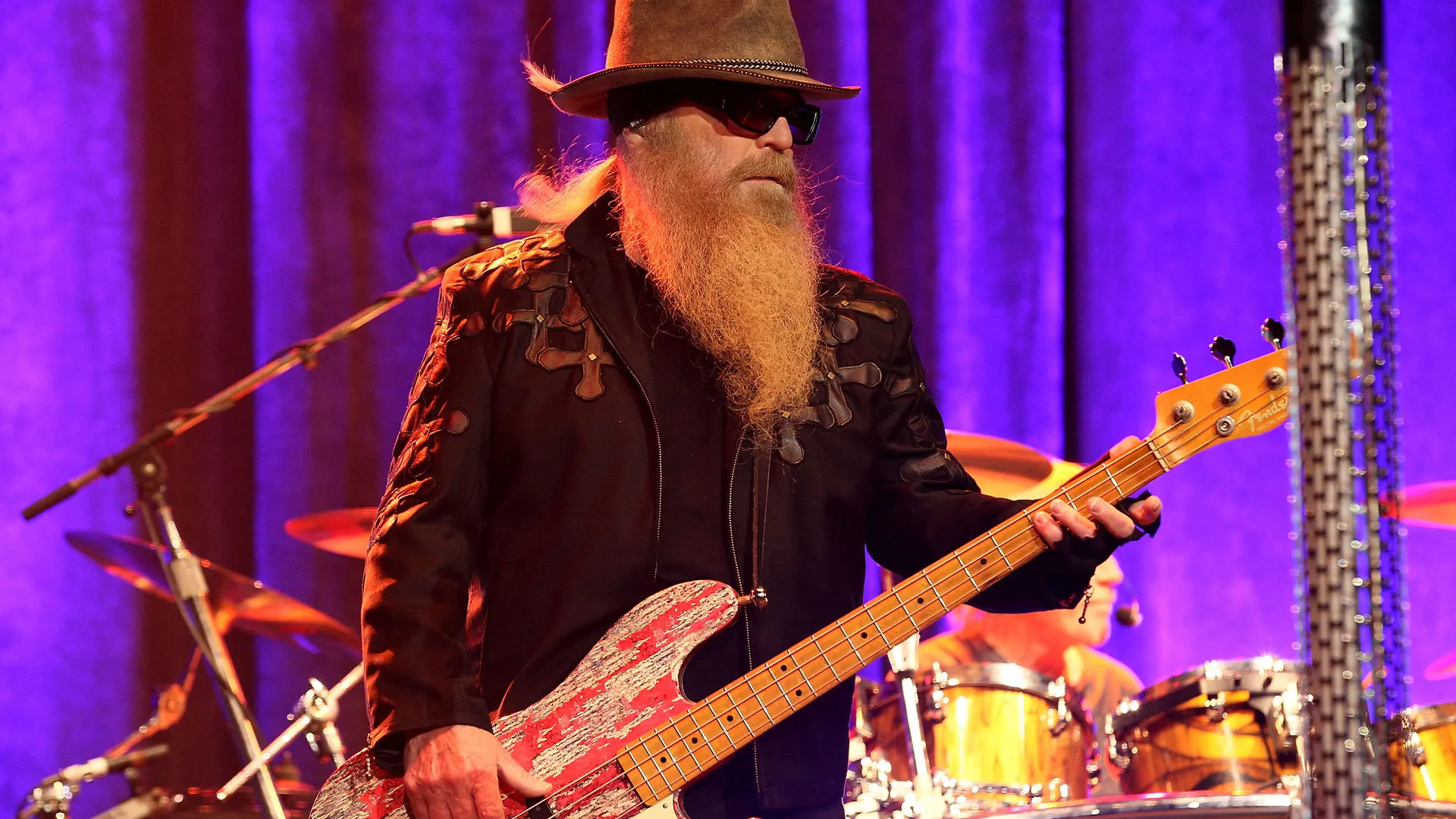Dusty Hill- The Sound And Spirit Of A Bass Legend
When we think about the heart and soul of a truly enduring rock and roll sound, one name often comes to mind for those who appreciate a powerful, ground-shaking low end: Dusty Hill. He was, you know, a foundational figure whose presence and playing style gave a distinct feel to music for decades. His way of making music, with its deep rumble and undeniable power, truly set a standard for what a bass player could bring to a group's overall sound. It's pretty amazing, actually, how his contributions shaped so much of what we hear.
His influence, you see, stretches far beyond just the notes he played. It's about the very character he brought to the stage, the kind of laid-back yet incredibly potent force that held everything together. People who knew his work often talk about a sound that was both very, very solid and had a bit of a rough edge, something that truly resonated with listeners and fellow musicians alike. He had a way of being that just made you feel like he was exactly where he needed to be, always.
So, as we think about the impact of a musician who truly made a mark, it feels right to spend some time exploring what made Dusty Hill so special. From the custom-built instruments that became extensions of his musical voice to the specific choices he made to get that big, full sound, there's a whole lot to unpack. We will also, you know, touch on the meaning of the word "dusty" itself, and how, in a way, it might just fit the man who gave us so much incredible music.
Table of Contents
- Dusty Hill- A Life in Rhythm
- What Made Dusty Hill a Dangerous Bass Player?
- How Did Dusty Hill Get His Signature Sound?
- The Instruments That Shaped Dusty Hill's Groove
- Why Did Dusty Hill's Tone Have So Much Bottom?
- Beyond the Music- The Meaning of Dusty
- Did Dusty Hill Live in College Station, Texas?
- Finding Your Own Dusty Hill-Inspired Sound
Dusty Hill- A Life in Rhythm
When we talk about Dusty Hill, we're really talking about a person whose musical life was deeply intertwined with the very fabric of rock and roll, especially the kind that came out of Texas. He was, in a way, a quiet force, someone who held down the low end with a kind of power that you just felt in your bones. His story is one of enduring presence and a consistent commitment to a particular kind of sound that, you know, just worked. It's pretty cool to think about how long he was at it.
He was a person who, by all accounts, had a very pleasant and easygoing manner, but don't let that fool you, actually. Beneath that calm exterior was a truly skilled and impactful player of the low-pitched instrument. Someone who made it through those intense musical battles in Texas during the 1960s and 1970s, and appeared on stages for decades. That, you know, takes a certain kind of strength and staying power. He was, for sure, a true survivor of the music scene.
It’s a bit surprising, perhaps, to learn about some of his personal connections and where he spent his time. For instance, the person sharing this information made their home in College Station, Texas, for nearly four decades and had no idea that Dusty Hill also lived there. That, you know, speaks to his private nature in some respects, even while he was a public figure. He was just a guy, more or less, living his life.
Here are some personal details about Dusty Hill, gathered from various accounts:
| Detail | Description |
|---|---|
| Demenaor | Fun and laid back, easygoing and pleasant |
| Playing Style | Dangerous, skilled, impactful bass player |
| Musical Roots | Survived Texas rock & roll wars of the sixties and seventies |
| Residence (at one point) | College Station, Texas |
What Made Dusty Hill a Dangerous Bass Player?
So, when someone calls a musician "dangerous," what does that really mean, particularly for a player of the low-pitched instrument like Dusty Hill? It's not about being, you know, physically threatening. It’s about the sheer impact and force of their playing, the way they can shake a room and command attention without being flashy. Dusty, you see, had that kind of presence, that sort of power that just made him stand out. He was, in a way, a quiet storm.
His "dangerous" quality came from his ability to lay down a groove that was, actually, incredibly solid and unyielding. He wasn't about showing off with a lot of fast notes or complicated runs. Instead, he focused on making the music feel incredibly heavy and deep, providing a foundation that the guitars could build upon. That, you know, is a skill that often gets overlooked but is absolutely essential for a group’s overall sound. He was, essentially, the bedrock.
The fact that he made it through the intense musical battles in Texas during the 1960s and 1970s is a testament to this. Those were times when bands had to, you know, really earn their keep on stage, playing night after night in sometimes rough places. To survive that, to come out on top, means you have a certain kind of grit and determination. Dusty Hill, it seems, had that in spades, which is pretty cool to think about, really.
How Did Dusty Hill Get His Signature Sound?
Getting a particular sound, a signature tone, is something every musician strives for, and Dusty Hill, you know, absolutely nailed his. He spoke about it himself in a talk from 2012, saying his musical output was large, weighty, and had a slightly rough edge since it needed to sit above the guitar's sound. That, you see, gives us a really good clue as to what he was going for. It wasn't about blending in; it was about standing out in a very specific way.
He wanted his bass to have, essentially, a presence that was unmistakable. When someone asked him to explain how his sound felt, he had a very clear idea. It was about creating a low-end rumble that was, you know, almost like a separate entity, something that you could feel as much as hear. This approach meant he had to make some very specific choices about his instruments and the gear he used, which is pretty interesting, if you ask me.
A player of low-pitched instruments, Mario Winnikes, from Europe, was chatting with Dusty about the cords for his instrument back in the 1980s. Mario asked him what he used, and Dusty, being the kind person he was, nicely offered him some collections of them. This shows, in a way, that he was willing to share his knowledge and his tools, which is not something every musician does. He was, really, quite generous.
The Instruments That Shaped Dusty Hill's Groove
A huge part of Dusty Hill's distinctive musical voice came from the instruments he chose to play. It's a pretty well-known fact that a gentleman named JB, John Bolin, made nearly all the instruments Dusty played. This close relationship with a maker meant that Dusty's instruments were, you know, truly crafted to his specific needs and preferences, which is a big deal for any musician. It’s like having a tailor make your clothes, but for your sound, actually.
The person sharing this information is, in fact, lucky to have two of those instruments made by JB, which is pretty cool. They mentioned that JB had previously said that the people who took care of the instruments for Dusty and Billy would frequently be involved with them. This suggests a continuous process of care and adjustment, making sure the instruments were always in top shape for their demanding performances. It's not just about owning the instrument; it's about maintaining it, too.
One particular instrument described comes in at just over seven pounds and feels good to hold. It also has a light brown, aged look and shows a few small cracks in its surface, which gives it a lot of character. This instrument also had a good, not heavy, leather holder from Fender Custom Shop. These details, you know, paint a picture of an instrument that was not only built well but also had a story, a history of being played and loved. It's pretty much a piece of art, in a way.
There's also talk of a special, limited version of the Fender Custom Shop low-pitched instrument named after Dusty Hill. This instrument is said to have a really good long part, which is important for playability. Some players think there's a benefit to the feeling of more tightness on the lowest string when the instrument's top part is turned around. These are the kinds of specific details that, you know, serious players think about when trying to get a particular feel and sound.
Why Did Dusty Hill's Tone Have So Much Bottom?
When people talk about Dusty Hill's sound, one of the things that comes up again and again is the sheer amount of "bottom" it had. You'll probably find that overall, his sound had a bit of roughness but also a lot of deep resonance in it. It's that deep, resonant quality that really made his bass lines feel like they were, you know, truly anchoring the music, giving it a weight that was hard to ignore. It was, essentially, a physical experience.
It sort of sounds like he was using many large speakers, perhaps 15-inch ones, with a touch of rough guitar sound mixed in. This combination is key to getting that massive, full low end that still has some edge to it. The idea of using larger speakers is that they can move more air, creating a deeper, more powerful sound. And adding a bit of guitar roughness means the sound isn't just clean and deep; it has a bit of bite, too, which is pretty interesting, really.
For those trying to make their music sound as much like Dusty Hill's as they can, there are specific devices they've tested. One mentioned is an Electro Harmonix Battalion Bass Preamp 3, and a Big Muff when put to use for it. These are devices that, you know, help shape the sound, adding that particular kind of distortion and grit while maintaining the deep low end. It's about finding the right tools to get that specific feel, which is, you know, a common quest for musicians.
Beyond the Music- The Meaning of Dusty
It's kind of funny, in a way, to think about the word "dusty" itself when talking about Dusty Hill. The word "dusty" can mean coated with fine particles, or full of tiny bits of earth or sand, especially when it hasn't rained for a long time. You can use a soft brush to clear away particles from things that have gathered them. But it also has another meaning, you know, a figurative one. When you call something "dusty," it can truly be coated with fine particles or has a feel of being truly old and uninspired. That's from a dictionary for those learning more words, explaining what it means, how to say it, an image, how it's used in sentences, rules for using words, and similar words.
So, in a sense, while Dusty Hill's music was never "uninspired," there was a certain "old school" or, you know, a kind of timeless quality to it that might, just might, connect to the literal meaning of the word. His sound wasn't about chasing the latest trends; it was about a classic, enduring rock and roll feel. This, in a way, makes his musical creations feel like something that has been around for a while, something that has stood the test of time, like a familiar, well-loved object that has gathered a bit of history, you know, a bit of character. It's pretty cool how that works out.
When you hear about a musical creation that takes its cue from Dusty Hill, a dark or bright color could be an option. This might be a nod to his instruments or his general aesthetic. It’s about, you know, capturing the essence of his vibe, not just the sound. The name itself, "Dusty," for a person who played such a foundational, earthy kind of music, seems, in some respects, almost too perfect. It suggests something real, something grounded, which is pretty much what his playing was all about.
Did Dusty Hill Live in College Station, Texas?
It's a really interesting tidbit, actually, that Dusty Hill made his home in College Station, Texas, for nearly four decades. The person sharing this information mentioned they had no idea he lived there, even though they were also in College Station for such a long time. This detail, you know, just goes to show that even famous people can live relatively private lives, blending into their communities in ways you might not expect. It’s not always about the glitz and glamour, as a matter of fact.
This little piece of information, you know, helps to ground Dusty Hill a bit more, showing him not just as a rock star but as someone who had a regular home life in a specific place. It connects him to the everyday, which is pretty cool. It also highlights how much of a local presence he might have been, even if quietly so. He was, essentially, a Texan through and through, and his choice of home reflects that deep connection to the state that shaped his music.
Finding Your Own Dusty Hill-Inspired Sound
For anyone working to make their music sound as much like Dusty Hill's as they can, it's clear there's a specific path to follow. It's not just about getting the right instrument, though that helps a lot, you know. It's also about understanding the philosophy behind his sound: that big, heavy, slightly rough edge that needed to sit above the guitar's output. That, you see, is the core idea to grasp. It's about presence and power, really.
As mentioned, some players have tested some different devices already, like the Electro Harmonix Battalion Bass Preamp 3 and the Big Muff. These tools are, you know, designed to help add that particular kind of texture and low-end depth that was so characteristic of his playing. It's about experimenting with different ways to get that grit and that whole lot of bottom, making it sound like you're playing through many large speakers with a touch of rough guitar sound. It’s a process of tweaking and listening, pretty much.
And remember, it's not just about the gear; it's about the feel, too. Dusty Hill was a player who survived those intense musical battles of the sixties and seventies, which means his playing had a certain resilience and raw energy. Trying to get that feel means, you know, really digging into the groove, making every note count, and providing that unshakeable foundation for the rest of the group. It's about being a solid, impactful player, which is, honestly, what he was all about.
This article has explored the impact of Dusty Hill, touching on his unique sound, the instruments that helped create it, and the personal aspects of his life. We looked at how his musical output was large, weighty, and had a slightly rough edge, needing to sit above the guitar's sound. We also considered the role of specific instruments made by JB, and how a particular bass came in at just over seven pounds with a light brown, aged look. The discussion covered the meaning of "dusty" and how it might relate to his timeless musical style. Finally, we touched on his residence in College Station, Texas, and how musicians can work to achieve a sound inspired by his powerful low-end presence.

Dusty Hill | Kerrang!

Dusty Hill News

Dusty Hill News